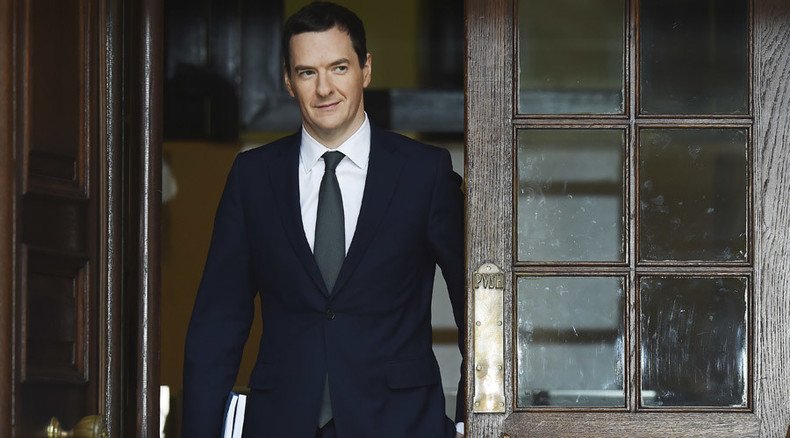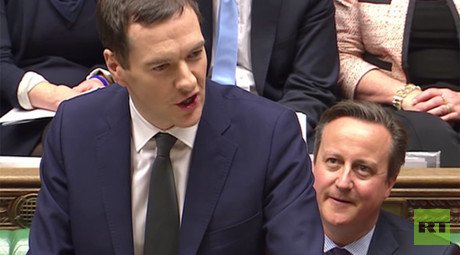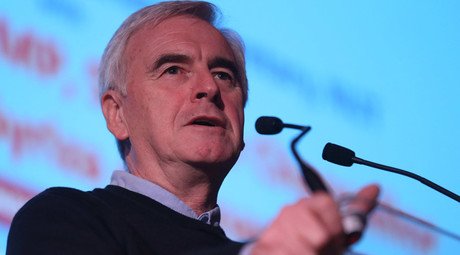‘How will he pay for it?’ Osborne’s Autumn Statement is full of surprises

Chancellor George Osborne pulled more than a few surprises from his little red box during the spending review on Wednesday afternoon, including a complete U-turn on tax credit cuts and a boost to the budgets of a number of public sector services.
Healthcare, policing and defense all featured high up on Osborne’s priorities. He said the revised tax revenues from the Office of Budget Responsibility (OBR) had given the Westminster coffers a boost.
RT examines the 5 most important announcements in the chancellor’s Autumn Statement.
Surprise concessions
The biggest shock announcement was the scrapping of cuts to tax credits, which were scheduled to go ahead this year. He had promised to re-examine the effects of the £4.4-billion worth of cuts, but instead wheeled out a full U-turn, which Labour quickly claimed as a victory.
John McDonnell whips out Mao's Little Red Book, reads to Osborne & throws it across to him https://t.co/QoYiuUYwcZpic.twitter.com/8lJ2KhRdcj
— RT UK (@RTUKnews) November 25, 2015Osborne said tax credits were being “phased out” to make way for the new Universal Credit system. Dropping the measure was therefore spun as logic rather than an embarrassing volte-face.
The chancellor was also expected to slash policing budgets, to the dismay of officers across the country. Instead, Osborne announced the counter-terror budget is being increased by 30 percent.
“The police protect us, so we will protect them,” he said.
Public sector priorities
Osborne delivered on his promise to provide more funding to frontline NHS services, and has announced a £3.8-billion boost for next year, as well as earmarking a £600-million fund for mental health services. It is not yet clear where savings have been made elsewhere in the health budget to allow such generosity.
He also revealed the education budget would be protected and funding for further education colleges would be protected.
Housing for the young
Another one of Osborne’s priorities has been to make housing more affordable to young people who are currently unable to get on the housing ladder.
He announced that 400,000 more houses will be built, in what he referred to as “the biggest affordable housing program since the 1970s.”
The government will give £2.3-billion worth of support to starter homes, which will have a maximum value of £250,000 outside London and £450,000 within the capital.
Where’s the money coming from?
Without announcing many new cuts to services and with a balanced budget still high on Osborne’s agenda, the burning question is “where’s the money coming from?”
The chancellor said recalibrated tax revenues had given the budget a £27-billion fiscal windfall, but increased spending means Britain will breach its own welfare cap three years running, the OBR revealed.
“Our central forecast shows that the terms of the welfare cap are set to be breached in three successive years from 2016-17 to 2018-19, with the net effect of policy measures raising welfare cap spending in each of those years, and to well above the two percent forecast margin in 2016-17 and 2017-18,” the Office of Budget Responsibility says.
Can Britain afford it?
Institute for Fiscal Studies (IFS) Director Paul Johnson told the BBC Osborne “got lucky” with his calculations.
“[Osborne] has got a bit lucky, in that there are some more tax revenues expected to come in by the OBR. And he’s got a bit lucky because he’s going to be spending a bit less on debt interest. He has also increased taxes reasonably significantly. There’s a £3-billion tax on business to pay for the new apprenticeships. And there are some increases in council tax, probably. And there are some other tax increases there.
“So he’s done two things. He has taken advantage of increased revenues and reduced spending on debt interest. He’s increased taxes a bit. And he’s essentially used most of that money to damp down the cuts in spending. And because those cuts in spending were on a relatively limited part of government, the effect of that bit of extra money is to significantly reduce the overall level of cuts.”














